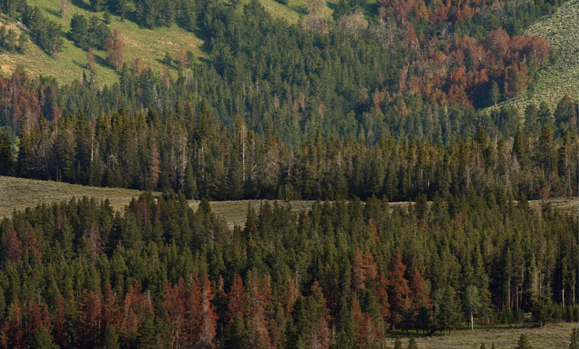Global warming feeds bark beetles: Are they unstoppable?
By Dean Kuipers
27 February 2012 Hear the sound of chewing out in our vast forests of lodgepole pine, spruce and fir, the chewing that’s already destroyed half the commercial timber in important regions like British Columbia? That’s the sound of climate change, says biologist Reese Halter. Global warming in the form of a bark beetle. Halter’s short but disturbing new book, The Insatiable Bark Beetle, addresses one of the biggest and most visible issues facing global forests, and particularly the relatively large forests left in the U.S. and Canada. As winters grow warmer and summers drier, the West’s evergreen forests are being eaten alive. And the infestation is not showing any signs of slowing. The most disturbing part? Halter puts the blame squarely on climate change, of which the infestations are not only a symptom but a cause – a feedback loop. “The beetles have taken a crucial terrestrial system that absorbs carbon dioxide (CO2) – what’s known in biological parlance as a ‘carbon sink’ – and turned it into a ‘carbon source,’” Halter writes. “Over the next decade, the beetle-killed BC forests will emit 250 million metric tons of CO2 – the equivalent of five years of car and light truck emissions in Canada.” A good portion of this easy-reading book is about loops, actually. How melting permafrost releases methane, which raises global temps and melts more permafrost; how stressed trees attract beetles, which kill the trees, which attracts more beetles; how global warming accelerates global warming. Halter has simplified some of the science in order to make it a quick read, but it’s kind of like reading a well-written death report. Uplifting, it ain’t. What Insatiable does well, however, is convey the information fast and straight. Like Halter’s earlier book, The Incomparable Honey Bee, the beetle book is an attractive, small-format mini-tome printed by Rocky Mountain Books, in a series apparently devoted to eco-manifestoes. This is one. Bark beetle infestations have been big news for at least 15 years, with whole mountainsides of conifers very visibly dead and brown in the middle of otherwise healthy forests, and a lot of focus has been on winter temperatures and rainfall. When early fall and late spring temps dip deep, down to a range of -13 to -40 degrees Fahrenheit, the beetles are killed off. But that’s not happening now. The trillions of beetles involved didn’t blow in from somewhere else, either: the main culprit, the mountain pine beetle, is indigenous to North America. Only about the size of a grain of rice, it swarms trees with a synchronous attack, thousands or millions of beetles on one tree at a time, overwhelming the tree’s natural defenses such as its resinous sap, which contains terpenes and other chemicals which are designed to repel bugs, fungi, and other invaders. Even trees that aren’t stressed by heat or drought can be overwhelmed by the scale of this attack. […]

GRRRRRRRR. Left this comment (in moderation) at the LA Times:
There is actually something to be done to slow the bark beetles, which is to stop burning fuel, and not because of climate change (although that needs to be tackled by the same method).
What is really killing the trees is air pollution. Scientists have been documenting the connection between beetle attacks and tropospheric ozone in southern California for decades. The trees lose their ability to defend against insect attacks when needles and foliage are damaged from absorbing toxic fumes.
So, the good news is, if people could start conserving like crazy, the air would clear relatively quickly and the trees could recover.
It's important to note that it isn't only pine trees that are succumbing to beetles. ALL trees, everywhere, are dying from pollution directly or because of opportunistic attacks from fungus and disease. They also lose their roots and become more vulnerable to drought and wind.
Dr. Reese knows better than to blame climate change, see correspondence last fall: http://witsendnj.blogspot.com/2011/10/everybody-sooner-or-later-sits-down-to.html
The EPA has a draft linking hundreds of published research papers proving that ozone not only damages trees (and human health!) but is causing significant losses in yield and quality to annual crops we rely on for food, excerpts: http://witsendnj.blogspot.com/2012/02/prosaic-and-amenable-endochronometer.html